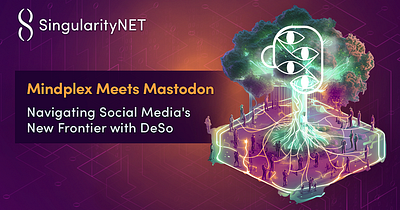
As we lurch wildly toward the Singularity, key aspects of our society and economy are evolving and shifting remarkably fast AI is one of these, quite clearly and social media is another. The high-speed dissolution of Big Tech social media has been fascinating to witness. Elon Musks bizarre destruction of Twitter/X has been the most glorious example of the phenomenon, but its a broader trend than that.
There is an emerging consensus across various sectors of online society that, all of a sudden, there are really no big inclusive social media venues worth extensively hanging out in anymore.
This recent Business Insider article sums up the situation nicely from a very straightforward mainstream-user perspective, hitting many of the same themes I covered in my more comprehensive tract on Decentralized Social Media earlier this year.
The problem were seeing today isnt a lack of social media platforms there are plenty, with different subcommunities and different foci. And its not so bad if, instead of getting locked into big monolithic walled garden platforms that try to eat the whole web, each of us spends a fraction of our social media time in a different, smaller online community that is appropriate to a particular aspect of our lives. But still, there are some occasions when wed like to quickly and simply broadcast something to our whole broader networks or find out whats going on with a certain person, or whats being said on a certain topic, across all the relevant networks out there.
One could envision the dwindling and confusion of social media as a feature, not a bug arent there better things to do with our time? Social media is a necessary and valuable aspect of the current era; the problem is that its been implemented mediocrely at best due to its domination by corporate interests with narrow profit motives at the fore, and the social media ecosystem now is still in a complex phase of recovery from this situation.
The conceptual solution to the current social media problematic is clear: its the interoperability, stupid! Identity should be shareable across different social media networks, contact lists and histories should be portable and easily queryable, and rights to do various things with them should be simple for users to grant according to various different arrangements. The technology to enable this is also readily available now. The bottleneck is in deployment and rollout theres a tragedy of the commons issue in that for any particular social media network project, putting effort into interoperability technology provides only modest advantage whereas robust interoperability, once leveraged widely, would provide tremendous advantage to the ecosystem as a whole.
One of the guiding lights in the DeSo world has been Mastodon, a Twitter-like alternative since 2016, leveraging the ActivityPub decentralized social networking protocol. With nearly 2 million users, Mastodon has not yet seen Big Tech social network levels of adoption, but its growing rapidly. An increasing number of corporate social media tools like Flipboard, Threads, and Tumblr have either adopted ActivityPub or professed their intention to. The other leading Twitter alternative, BlueSky, has its own protocol, which, however, will be made interoperable with ActivityPub. Whether ActivityPub will really lead the way to a new, richly interoperable social media future remains to be seen, but it seems like the most serious concrete path out there right now.
ActivityPub and Mastodon dont solve all the problems associated with modern social media but they dont have to!
The beauty of open source code and open, decentralized networks is that anyone can add innovative new twists and push them out to the market.
Two key aspects of DeSo that Mastodon and ActivityPub dont directly address are: transparent cross-network assessment of reputation, and use of tokenomic models to provide innovative ways to pay for social media services.
Which brings me to the punchline of this post: My colleagues at Mindplex magazine, the futurist online media source Ive recently co-founded, have been working on a Mastodon fork that incorporates these two aspects along with the usual Mastodon goodness. And now, its launched for everyone to try!
Our forked version of Mastodon is initially being launched as a sort of beefed-up comments and discussion forum for Mindplex magazine a place to freely discuss Mindplex articles and videos and such, and then project ones comments out to the whole Fediverse (the ActivityPub/Mastodon universe). How it will grow and evolve, and what forks may grow on the fork, remains to be seen We are looking at some next steps involving the integration of generative AI collaboration tools, for example. But even in this initial form, I believe the integration of tokenomic and reputation aspects forms a quite interesting step forward.
Anyway, it is very exciting that DeSo, along with so many other futuristic technologies, is more and more in the domain of reality rather than just vision and theory. So, Ill end with an invitation: Sign up for Mindplex Social on Mastodon now and help us experiment and play while working to create the future of DeSo and move toward a beneficial decentralized Singularity!
SingularityNET is a decentralized Platform and Marketplace for Artificial Intelligence (AI) services. Our mission is the creation of a decentralized, democratic, inclusive, and beneficial Artificial General Intelligence (AGI), democratizing access to AI and AGI technologies through:

Subscribe to Synapse, SingularityNETs AI Landscape Outlook Newsletter